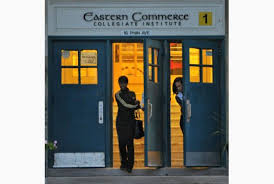Low-enrolment schools=more than #s
 The Toronto public school board is quietly shutting down Eastern Commerce and Nelson Boylen, the two most under-enrolled schools in the city even though neither has been part of a required area review. Not small schools — more like big families. While they have the lowest enrolment of all high schools in Toronto, students and staff say there’s much more to Eastern Commerce and Nelson A. Boylen than just their numbers.
The Toronto public school board is quietly shutting down Eastern Commerce and Nelson Boylen, the two most under-enrolled schools in the city even though neither has been part of a required area review. Not small schools — more like big families. While they have the lowest enrolment of all high schools in Toronto, students and staff say there’s much more to Eastern Commerce and Nelson A. Boylen than just their numbers.
They are schools that feel like home; places that have nurtured teens’ minds but also their hearts, motivating them to come to school and do well, while forging close relationships with all of the adults in the building — at Boylen, all staff, including the principal, “adopt” a struggling student to mentor, and monitor — something they wouldn’t have done in the hustle of a larger secondary school.
But it is because of their numbers that both are shutting down at the end of June — too costly to keep running with just 67 students (Eastern) or 80 (Boylen). With enrolment expected to continue to dwindle, so, too, would course offerings.
“At my old school, I didn’t even know my home teacher’s first name — here I know every teacher on a first-name basis,” said 16-year-old Delon Jemmott, who switched to Eastern last year and found his home, as well as a place on the school’s superstar basketball team.
“It’s really more of a family atmosphere — everybody is greeted with a good morning smile, and they serve food in the morning to us. I see it not as a small school but a big family.”
Grade 11 student Sytra Mohammed left Eastern briefly but returned after a semester because she missed it so much. Now, with the help of teachers at Eastern, she is trying to find a new place to go.
“I know this school is one in a million, so I’m never going to try to compare it to anything else because this school is so special,” she said, describing herself as “heartbroken” over the shutdown.
The Toronto District School Board shaved Grade 9 off both schools in recent years when too few students signed up, something critics say sealed their fate. Even though the board didn’t hold the required area reviews before announcing the schools would close, board staff directed that students be redirected this fall. (The schools were just recently included in two new review committees struck by the board.)
The lack of consultation is not lost on families, upset they were given no notice.
“It’s going to be like something’s missing from the community,” said 17-year-old Naomi Chavez, who arrived at Boylen three years ago from Ecuador, not speaking a word of English. Today, she’s involved in student council, a cooking club run with Toronto police, and has been accepted to all the colleges she applied to for culinary arts.
“This was not a community decision,” and at a recent meeting about 100 people came out to protest, she added.
“If the consultation could have come first, maybe the community could have done something about it — advertised the school, started a campaign. This is really sad.”
She also worries about the future of the school’s 20 students with developmental disabilities, who integrate with those in the mainstream program through reading buddies and daily lunchtime dancing.
Boylen principal Ian Botnick expects the special needs classes, which go on daily outdoor walks in the community, will stay put as the board determines what to do with the school. The building has a large sensory room for them, full of equipment — including a swing and bike, which they love — as well as a classroom with shelves full of products for students to sort or learn how to keep inventory.
In the regular academic program, both Eastern and Boylen have managed to offer several electives on top of mandatory credits. (At Boylen, that includes African drumming or keyboarding.) They’ve had to get creative to do that, combining grades or academic and applied-level classes, given the handful of staff.
“We have a very strong, caring, nurturing staff who have really gone above and beyond over the past several years to provide outstanding instructional programming within a nurturing, positive and personalized environment,” said Eastern principal Jennifer Chan.
She hopes the success students have had at Eastern will help them in their transition to a new school, both academically and socially.
“I do feel that really good teaching and learning has happened here, and I hope that can be captured and celebrated, and that we aren’t just viewed as ‘Oh, that school with 67 students.’ There’s been a lot of positive programming here.”
At Eastern, that included a “late start” pilot project to help teens get more sleep, and to give them more time to commute to the school, near Danforth and Donlands.
At Eastern, teachers Heather Gillett and Brian Eng are helping students find new schools, making contact with guidance counsellors at other schools and meeting with families. They are aware of the close bonds between staff and students and say it was one of the bonuses of working at Eastern.
“That’s the piece I’m most concerned about,” added Gillett, who is head of student services. “Relationships are going to be broken off mid-stream, and we are all about relationships in this building.”
For Austin Pool, who runs guidance at Boylen, “it’s important to know there will be somebody there (at the new school) — a caring adult” to help teens with the transition. He also made sure there is a “Boys to Men” mentoring program at a school where six male students are headed.
“This is a huge transition for students,” he said.
For now, Eastern’s Jemmott is unsure about attending a new school. “It’s kind of like going to buy a new pair of shoes,” he said. “This fits so well and I’m comfortable here, I don’t want to have to go back and break in a new school.” Published on Mar 15 2015 Kristin Rushowy EDUCATION REPORTER http://www.thestar.com/yourtoronto/education/2015/03/14/low-enrolment-schools-are-more-than-numbers.html



